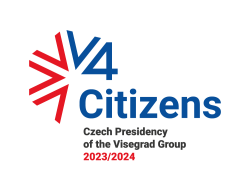
| Thu | Fri | Sat | Sun | Mon |
|---|---|---|---|---|
| 23 | 26 | 30 | 26 | 22 |
| Thu | Fri | Sat | Sun | Mon |
|---|---|---|---|---|
| 27 | 28 | 34 | 28 | 27 |
| Thu | Fri | Sat | Sun | Mon |
|---|---|---|---|---|
| 27 | 29 | 33 | 34 | 28 |
| Thu | Fri | Sat | Sun | Mon |
|---|---|---|---|---|
| 28 | 30 | 33 | 36 | 30 |
Final Declaration of the Conference of Presidents of Parliaments of V4 Countries
The conference of Presidents of Parliaments of V4 Countries took place in Prague on September 15–16, 2011, under the chairmanship of H.E. Milan Štěch, President of the Senate of the Parliament of the Czech Republic.
Milan ŠTĚCH, President of the Senate of the Czech Republic, Vlasta PARKANOVÁ, Deputy Speaker of the Chamber of Deputies of the Czech Rep., László KÖVÉR, Speaker of the National Assembly of the Republic of Hungary, Bogdan BORUSEWICZ, Marshall of the Senate of the Republic of Poland, and Richard SULÍK, Speaker of the National Council of the Slovak Republic.
The participants recalled the 20th anniversary of the signing of the declaration on cooperation between the Republic of Hungary, the Republic of Poland and the Czech and Slovak Federal Republic which had laid foundations of the Visegrad Group. Furthermore, they recognised the fact that all member countries of V4 had fully integrated into the Euro-Atlantic structures and acknowledged the exceptional year of 2011 when Hungary and Poland assumed the presidency of the European Union.
The first session on "The Role of National Parliaments in Scrutinising and Passing European Legislation after the Adoption of the Lisbon Treaty" was opened by an intervention of Mr. Vladimír Špidla, former Prime Minister of the Czech Republic and former European Commissioner for Employment, Social Affairs and Inclusion.
In this context, the participants:
stated that the involvement of national parliaments as legitimate representatives of the people of members states in the European Union decision making processes was a step necessary to strengthen the democratic principles of decisions made by the European Union bodies and an important instrument for division of activities between the European Union and individual member states particularly in connection with the application of the principle of subsidiarity and proportionality;
-
encouraged the parliaments and governments of the countries represented at the summit
- to pay due attention to discussion on national level of EU draft legislation and enhance the influence of citizens on the content of Union policies;
- to note the fact that the relationship between the government and the parliament should be based on partnership and cooperation instead of mere information sharing about government activities with the parliament;
- to pay attention to early exchange of information on pre-selection of legislative proposals announced by the European Commission which is indispensable for effective identification of the documents that seem questionable from the point of view of the subsidiarity principle;
- to reconsider the actual provisions of the Lisbon Treaty concerning the scrutiny procedure in order to enable the national parliaments to scrutinize more effectively the European law-making process;
- called upon the parliaments of the EU member states to cooperate closely via the IPEX database, their permanent representatives in Brussels or other suitable channels so that in case of a clear violation of the subsidiarity principle identified by a majority of the national parliaments, the procedure of yellow or orange card could be started.
In the second session on "The Latest Development in the World Economy: Impact on Economic Policy of the Visegrad Countries and Possible Solutions" which had been added to the agenda because of the current situation, the participants:
- considering the open economic systems of the V4 countries expressed their concern with the slump in foreign demand and considerable impact on the economic situations in respective V4 countries in case of the recurrence of the economic crisis;
- stated that the continued risks and turbulences stemming from the sovereign debt crisis in the eurozone, threatening the functioning of the monetary union, have a negative impact on the whole European Union;
- called upon involved parties to consistently abide by the rules stemming from the accession treaties, including the Maastricht criteria and the Lisbon Treaty.
The third session on "The Balkans—Present, Future and Role of the Visegrad Group in the Stabilisation Process" was opened by an intervention of Mr. Miroslav Lajčák, former Minister of Foreign Affairs of Slovakia and former High Representative for Bosnia and Herzegovina.
In this context, the participants:
- appreciated the fact that two decades after the end of the bloody conflict in former Yugoslavia, Slovenia was a full member of the EU and NATO, Croatia, Montenegro and FYROM had the status of EU candidate countries and other countries including Albania were also aiming at EU membership, Croatia and Albania had already joined NATO;
- emphasized that the European and Euro-Atlantic perspective for the Western Balkans ranked among long-term common interests shared by the Visegrad Group countries. The Czech Presidency will continue to support the steps taken by Balkan countries towards EU and NATO integration, and will attempt to identify particular forms of assistance the Visegrad Group countries could give;
- called upon the ministers of foreign affairs of their countries to use the meeting with the ministers of foreign affairs of the Western Balkan states on November 4, 2011 to discuss the specific involvement of the Visegrad Group countries in the Western Balkans including the use of International Visegrad Fund’s experience;
- stressed that it would be in the interest of both the EU and the candidate and potential candidate countries to ensure high level quality of the EU enlargement process in the Western Balkans region through consistent application of the principle of conditionality.







